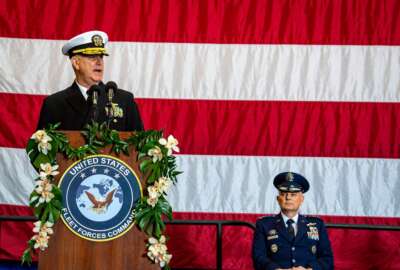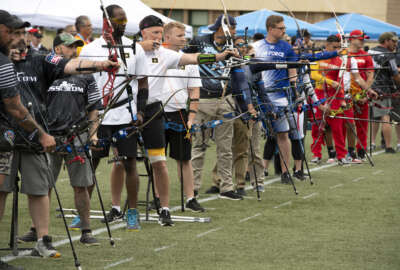Hubbard Radio Washington DC, LLC. All rights reserved. This website is not intended for users located within the European Economic Area.
Old organization helps with readiness of today’s troops
Almost everyone has set foot in a YMCA. Did you know there are Armed Services YMCAs with programs tailored to military service members?
Almost everyone has set foot in a YMCA. Did you know there are Armed Services YMCAs with programs tailored to military service members? It is devoted to the needs of junior enlisted service members. For what it is up to these days, the Federal Drive with Tom Temin spoke with CEO William French, who also happens to be a retired Navy vice admiral.
Interview Transcript:
Tom Temin Tell us more about the Armed Services YMCA. How many are there? Where do they tend to be located? And then we’ll get into what goes on there.
William French We’ve been in existence since 1861, the longest continuous serving military support organization in the country. Currently have 13 branches and 24 affiliates, and we support 90 bases across the country to include those both in Alaska and Hawaii. And our focus, as you said, is on supporting junior enlisted service members. So, pay grades E-5 and below. We do a multitude of different types of services. We support preschool, childcare, camping opportunities, food distribution, and we do various other things throughout the year. One big program we have now is thing called Operation Right Home, where we send military family members back home for the holidays. So last year we sent about 1800 family members back home to be with their families at the, you know, Thanksgiving and Christmas time.
Tom Temin I think of YMCA as a place where there’s a big, if maybe kind of old-fashioned gym somewhere and a big and maybe old-fashioned indoor swimming pool. But my memory goes back quite a number of decades. What are these like? Are they pretty up to date? What does someone encounter when they go inside?
William French So we are part of the broader buoyancy organization, but we’re spread all over the country. And instead of having the standard swim and gym type thing, we really focus on those programs that our junior enlisted service members and their families need. We work closely with the members of each base, where we provide support and make sure that we complement and supplement what they do, and that’s why we don’t have swimming, swimming pools and, and workout facilities. We’re really there to provide those programs that those young families need. And we’re primarily focused on taking care of the families. We think family readiness leads directly to operational readiness and making sure that those families are taken care of so that when those service members deploy and there’s a lot of that going on today, they don’t have to worry about what’s happening back home with their spouse and their kids.
Tom Temin So these services then are offered free of charge to the families. Or how does that work?
William French Combination of either reduced cost, very affordable or free in some cases. As an example, we provide free drop off care at military hospitals or military treatment facilities. We’re at 14 different locations now where these family members either spouse or, the military member themselves, can come in and drop their kids off, go to a medical appointment, get whatever they need done in the hospital, come back, pick their kids up, and that’s all free. That’s all part of what we do to make sure that those families have the opportunity. Because sometimes if you have a couple kids at home, it’s difficult to find childcare, find somebody watching here, you can go drop the kids off at the hospital. We’ll be watching you come back and pick them up. So, what we found is that the number of missed appointments at hospitals and military treatment facilities have gone way down as a result of having this program in place.
Tom Temin In serving those locales is the YMCA. The Armed Services YMCA tend to be close by or en route on the way out type of thing.
William French Exactly right. In some cases, we’re actually on the base or post and other cases we’re just off the base or post in a position where it’s easy to get for the for the service members of the families to get to our location. And we can provide the types of support that they need. So, we do before and after school care, childcare, we do camping opportunities for kids in the summertime. Oftentimes military kids just don’t have that opportunity unless we can provide that for them. And then we do, after school care. We do a couple different programs, Operation Little Learners, a program where we really teach the parents. It’s a parent child type deal, where we teach those parents how to be the primary educator, primary personnel responsible for their child’s development. Then we have another program that we run from second to seventh grade called Operation Hero, where we really work with the schools, the teachers, the parents, and we identify those kids that are, frankly, struggling a little bit when military kids. Are moved, they move every 2 to 3 years, so we have to break from once one group of friends move someplace else where they have to establish another group of friends. Some of them get behind, academically. Some of them struggle socially. This program is really designed to give them the confidence to be successful in the classroom, the successful work with each other.
Tom Temin We’re speaking with William French. He is CEO of the Armed Services YMCA and a retired Navy vice admiral. And in your job, how do you how do you relate to the military commanders whose people might be accessing these services? How do you know that what you’re offering is contemporary and needed by the particular location? And I imagine it varies from location to location also.
William French Yeah, that’s a that’s a really good question. So, I think we have the rapport and relationship with us with the senior officers, whether it’s the garrison commanders, the base commanders, or even more senior folks on the base. So, we really work to ensure that that works in their best when we really work to figure out what it is they need there and focus on providing that type of support. We’re open in two branches right now, one up in the northwest at Joint Base Lewis-McChord, and one we’re going to open up to San Antonio. We go through and do a survey beforehand to go talk to people, fill out survey forms to go figure out, hey, what is it that you need here most? Is it childcare? It’s about school care. What are the things that you need? Is it food distribution? So, we do all that research. We work closely, hand-in-hand with the base and the post leadership to ensure what we what we provide fits in with what they need.
Tom Temin And you mentioned and described a lot of programs for the children of the military member. What about the spouse? What about the family? Can they access services as a family, for example?
William French We think the number one thing we can do to support spouses is childcare, because you really can’t address the spousal employment issue without having childcare in place. So, we spent a lot of time, a lot of effort trying to expand childcare opportunities, making it so that spouses can go get whatever they need, the training they need, and then once they have the training, the ability to go to that job. So, we think childcare and all the related things help those spouses get employed. And once that happens, once you have two incomes of spouses working, a lot of the challenges that our young military families face kind of go away right now, we’ve seen a fairly significant increase in food insecurity post Covid. So just last year, we distributed 3 million pounds of food across our enterprise. And a lot of that, in my opinion, is because those spouses aren’t able to get either full-time employment, in some cases, even a part time employment. We found also so some of the spouses get the certifications skills necessary to be successful where they work, and they move. And then those type of job opportunities aren’t there. We try to work with them to get the skills they need in order to be successful in getting a job.
Tom Temin And just what are some of the statistics of people accessing the programs each year?
William French Overall, we impact about 600,000 family members across 90 different bases and again, assortment of different things that we can provide to them. And we continue to grow. We are in the throes right now working with DoD to open three new child development centers, one in the DC area, two down in Hampton Roads. That will bring about 250 kids in each location. And frankly, those are two locations today where we have the biggest shortfall of childcare from military’s long waiting list. And so, we’re trying to work with DoD to be able to address that challenge in those two locations.
Tom Temin Sounds like satisfying work.
William French Oh so awesome. I tell people, if you can’t be on active duty, the next best thing is to be able to go do this because you still get to see young, committed, dedicated members of our community of willing to serve our nation. So, it’s wonderful to see these folks.
Tom Temin William French is CEO of the Armed Services YMCA and a retired Navy vice admiral. Thanks so much for joining me.
William French Hey, Tom, thanks for having me. Thanks for all the great work you do to tell a story about what our what our military does every day.
Copyright © 2024 Federal News Network. All rights reserved. This website is not intended for users located within the European Economic Area.
Tom Temin
Tom Temin is host of the Federal Drive and has been providing insight on federal technology and management issues for more than 30 years.
Follow @tteminWFED
Related Stories
On DoD

WEDNESDAYS, 11 A.M. & 2 P.M.
Each week, Defense Reporter Jared Serbu speaks with the managers of the federal government's largest department. Subscribe on PodcastOne or Apple Podcasts.





